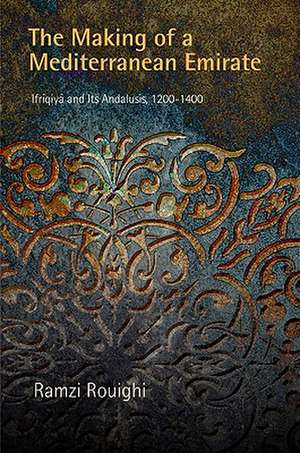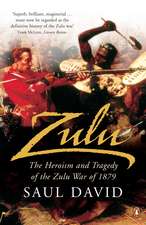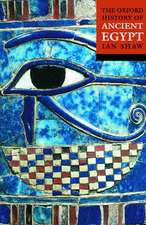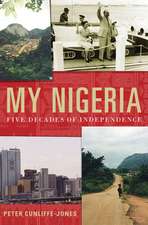The Making of a Mediterranean Emirate – Ifriqiya and Its Andalusis, 12–14: The Middle Ages Series
Autor Ramzi Rouighien Limba Engleză Hardback – 12 mai 2011
While historians have tended to conceive of Ifrīqiy as a region ruled by the Hafsids, Ramzi Rouighi argues in "The Making of a Mediterranean Emirate" that the Andalusis who joined the Hafsid court supported economic arrangements and political relationships that effectively prevented regional integration from taking place during this period. Rouighi examines an array of documentary, literary, and legal sources to argue that Ifrīqiy was integrated neither politically nor economically and that, consequently, it was not a region in a meaningful sense. Through a close reading of narrative sources, especially historical chronicles, Rouighi further argues that the emergence in the late fourteenth century of the political ideology of Emirism accounts for the representation of the rule of the Hafsid dynasty over cities as its rule over the whole of Ifrīqiy . Setting the activities of Andalusis such as the celebrated historian Ibn Khald n (1332-1406) in relation to specific political, economic, and intellectual developments in Ifrīqiy, "The Making of a Mediterranean Emirate" proposes a counter to the dynastic-centric view of the period that pervades medieval sources and continues to inform most modern generalizations about the Maghrib and the Mediterranean."
Din seria The Middle Ages Series
-
 Preț: 195.13 lei
Preț: 195.13 lei -
 Preț: 192.05 lei
Preț: 192.05 lei -
 Preț: 281.27 lei
Preț: 281.27 lei -
 Preț: 199.23 lei
Preț: 199.23 lei -
 Preț: 198.22 lei
Preț: 198.22 lei -
 Preț: 240.85 lei
Preț: 240.85 lei -
 Preț: 192.05 lei
Preț: 192.05 lei - 19%
 Preț: 509.33 lei
Preț: 509.33 lei -
 Preț: 245.45 lei
Preț: 245.45 lei -
 Preț: 232.87 lei
Preț: 232.87 lei -
 Preț: 286.76 lei
Preț: 286.76 lei -
 Preț: 192.05 lei
Preț: 192.05 lei -
 Preț: 247.43 lei
Preț: 247.43 lei -
 Preț: 231.78 lei
Preț: 231.78 lei -
 Preț: 193.04 lei
Preț: 193.04 lei -
 Preț: 191.00 lei
Preț: 191.00 lei -
 Preț: 216.43 lei
Preț: 216.43 lei -
 Preț: 267.27 lei
Preț: 267.27 lei -
 Preț: 285.64 lei
Preț: 285.64 lei -
 Preț: 285.64 lei
Preț: 285.64 lei -
 Preț: 248.56 lei
Preț: 248.56 lei -
 Preț: 323.44 lei
Preț: 323.44 lei -
 Preț: 197.18 lei
Preț: 197.18 lei -
 Preț: 230.41 lei
Preț: 230.41 lei -
 Preț: 243.06 lei
Preț: 243.06 lei -
 Preț: 154.43 lei
Preț: 154.43 lei -
 Preț: 191.00 lei
Preț: 191.00 lei -
 Preț: 317.31 lei
Preț: 317.31 lei -
 Preț: 406.68 lei
Preț: 406.68 lei - 11%
 Preț: 439.33 lei
Preț: 439.33 lei -
 Preț: 183.69 lei
Preț: 183.69 lei -
 Preț: 285.88 lei
Preț: 285.88 lei - 19%
 Preț: 363.86 lei
Preț: 363.86 lei -
 Preț: 242.82 lei
Preț: 242.82 lei -
 Preț: 290.05 lei
Preț: 290.05 lei - 19%
 Preț: 420.74 lei
Preț: 420.74 lei - 23%
 Preț: 538.83 lei
Preț: 538.83 lei -
 Preț: 458.15 lei
Preț: 458.15 lei - 30%
 Preț: 406.56 lei
Preț: 406.56 lei -
 Preț: 232.58 lei
Preț: 232.58 lei - 19%
 Preț: 365.58 lei
Preț: 365.58 lei -
 Preț: 198.22 lei
Preț: 198.22 lei -
 Preț: 322.52 lei
Preț: 322.52 lei -
 Preț: 174.65 lei
Preț: 174.65 lei -
 Preț: 405.32 lei
Preț: 405.32 lei -
 Preț: 243.06 lei
Preț: 243.06 lei -
 Preț: 428.40 lei
Preț: 428.40 lei - 19%
 Preț: 415.74 lei
Preț: 415.74 lei -
 Preț: 239.77 lei
Preț: 239.77 lei
Preț: 465.14 lei
Nou
Puncte Express: 698
Preț estimativ în valută:
89.00€ • 92.93$ • 73.50£
89.00€ • 92.93$ • 73.50£
Carte tipărită la comandă
Livrare economică 15-29 aprilie
Preluare comenzi: 021 569.72.76
Specificații
ISBN-13: 9780812243109
ISBN-10: 0812243102
Pagini: 248
Dimensiuni: 160 x 237 x 26 mm
Greutate: 0.5 kg
Editura: MT – University of Pennsylvania Press
Seria The Middle Ages Series
ISBN-10: 0812243102
Pagini: 248
Dimensiuni: 160 x 237 x 26 mm
Greutate: 0.5 kg
Editura: MT – University of Pennsylvania Press
Seria The Middle Ages Series
Cuprins
Introduction: Orientations PART I. THE LIMITS OF REGIONAL INTEGRATION Chapter 1. The Politics of the Emirate Chapter 2. Taxation and Land Tenure Chapter 3. Between Land and Sea PART II. EMIRISM AND THE MAKING OF A REGION Chapter 4. The Age of the Emir Chapter 5. Learning and the Emirate Chapter 6. Emirism and the Writing of History Conclusion: Departures List of Abbreviations Notes Bibliography Index
Recenzii
"This book is a much needed contribution to an understudied field. The use of narrative histories as source material is where Rouighi's remarkable talents as a historian emerge. He demonstrates that by asking the right questions, one can write social and economic history using sources focused on other agendas. Not only does he painstakingly extract information on land tenure, commerce, commodities, and rural life that the chronicles almost never address directly, he also explains the historical contexts in which the sources themselves came into being and what kinds of biases are embedded in them. Herein lies one of this book's major contributions: its simultaneous treatment of history and historiography."-Marina Rustow, Johns Hopkins University "An engaging and fresh look at the creation of the history of medieval Ifriqiya and the nature of political power and intellectual culture in the premodern Maghrib-a must-read for students and scholars of the region. Rouighi argues convincingly against the grain of the nation-centered historical paradigm, highlighting the challenges that faced Hafsid rule, and teasing out the subtleties of the intellectual tradition that emerged as the dynasty's standard-bearer."-Medieval Review














